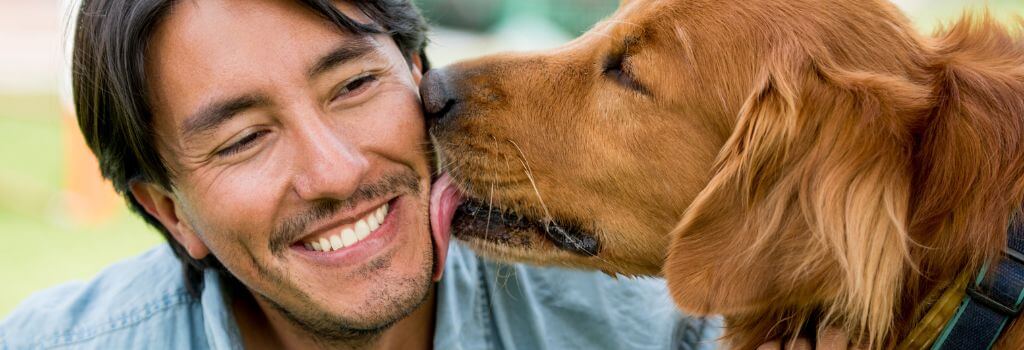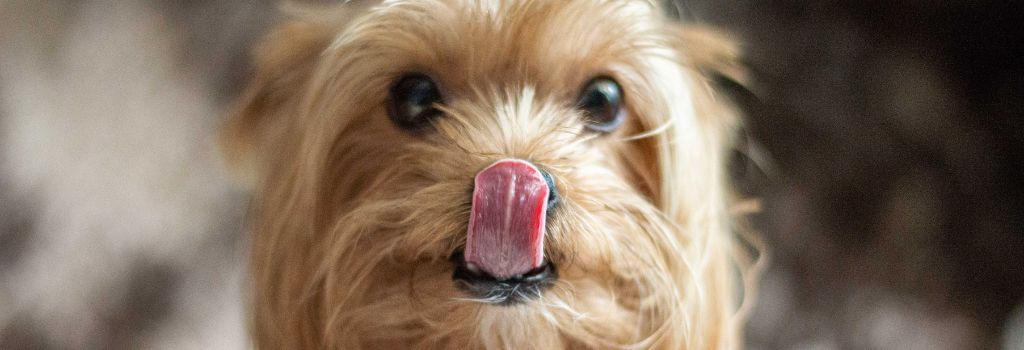At Newport Harbor Animal Hospital, we often get asked about a common canine behavior: licking. Licking is a natural and normal behavior for dogs, allowing them to groom, investigate their surroundings, and even communicate with other people and pets. Whether it's a quick swipe of the tongue or a full-on facial bath, dogs lick for a variety of reasons – some you might not even expect.
Let's explore some of the most common explanations behind this behavior and talk about when owners should be concerned about excessive licking in dogs.
Why Do Dogs Lick You and Things Around Them?
1. A Sign of Affection
Perhaps the most common – and the cutest – reason for a dog licking is to express affection. Just like a kiss or a hug, a lick from your dog is often a way of saying, "I love you!" This behavior stems from puppyhood, where mothers lick their pups to groom and comfort them.
Some owners may be initially concerned that licking or mouthing behaviors may be a display of a dog trying to show their dominance, but rest assured that gentle licking that isn't accompanied by other aggressive behaviors like guarding or staring is very normal and a sign that your dog trusts you.

2. Grooming and Social Bonding
Licking isn't always confined to just a dog's owners or guests in their house. Dogs lick each other as a form of social grooming, reinforcing their pack bonds. While dogs aren't as self-sufficient as cats when it comes to grooming, gentle licking can help keep their coat clean and clear dirt and debris from their limbs and paws.
When your dog licks you, they might be extending this grooming behavior to you, their beloved human "pack" member. A strong bond with their owner, as well as any other dogs in the household, is essential for fulfilling a dog's emotional, social, and physical needs. When dogs and their owners get along and bond, dogs can feel safer and more secure in their environment, reducing stress and anxiety, as well as letting their personalities shine through. These benefits of a strong bond extend to owners, too. Research has shown that dogs can improve our mental and physical health, and dog owners who have a good relationship with their dogs reap the most benefits.
3. Exploring the World Through Taste
Dogs have a powerful sense of smell and taste, with up to 300 million scent receptors in their noses and around 1,700 taste buds. Licking allows them to gather information about their environment. A dog licking their lips, their food bowl, or even you could also indicate that they smell something that they really want a taste of too.
If you've just eaten something tasty or have a salty residue on your skin, your dog might be investigating these interesting flavors. With this behavior, it's important for pet owners to be mindful of what's on their skin if their dog leans in for a lick. Some lotions, perfumes, and other beauty products applied directly to the skin can be harmful or toxic to dogs and are definitely something you don't want them to get a mouthful of.
4. Seeking Attention
Dogs are intelligent creatures and quickly learn that licking often elicits a response from their owners. Whether it's a gentle pat, a verbal acknowledgment, or even a slight push away, they realize licking gets them attention.
5. Self-Soothing and Anxiety
Excessive licking in dogs can sometimes be a sign of anxiety or stress, so dog owners will want to monitor the habit to ensure it doesn't become extreme or indicate mental or emotional distress. Dogs might lick themselves, objects, or people as a way to calm themselves down. If your dog is showing other signs of anxiety, such as pacing, panting, or trembling, it's important to consult with your veterinarian to get to the root of their behavior.
6. Medical Concerns
In some cases, excessive licking goes beyond normal behavior and can indicate a medical problem. Skin allergies, irritations, or gastrointestinal issues can cause dogs to lick excessively. If your dog is consistently licking a specific area or showing other signs of discomfort, a veterinary checkup is recommended to make sure everything is okay.
7. Showing Submission
In the canine world, licking can also be a sign of submission. Dogs might lick the face or mouth of a dominant dog or person to show deference. Think of it as a dog's way of saying, "I mean no harm!"
Familiar dogs may also exhibit this behavior when they are reunited after spending time apart – you may notice it when your dog meets up with their pals at the dog park or comes home and greets your other dogs after a solo trip to the vet.

When to Be Concerned About Excessive Licking in Dogs
While licking is generally a normal behavior, there are some situations where the behavior goes beyond what's "normal" and might warrant a closer look:
- Excessive Licking: If your dog is licking excessively and it interferes with their daily life, it's time to consult your veterinarian. Licking gets excessive when it goes beyond basic grooming or showing affection and causes your dog pain, discomfort, or distress.
- Licking Wounds: Constant licking of wounds can hinder healing and increase the risk of infection. This is true for everything from a hot spot to a surgical incision. If you notice that your dog is repeatedly licking a wound or sore, try to limit your dog's access to the affected area by using bandages, clothing, or E-collars.
- Sudden Changes: If your dog suddenly starts licking excessively, it could indicate a medical or behavioral issue.
How To Stop Your Dog From Excessive Licking
- Observe Your Dog: Pay attention to when and where your dog licks to help identify potential triggers or underlying causes. When you and your family veterinarian understand what's causing your dog's excessive licking, you can better address it with proper redirection, training, or medical attention.
- Provide Enrichment: Ensure your dog has plenty of mental and physical stimulation to prevent boredom and anxiety. When a dog's mental and physical needs are met, they're less likely to exhibit negative behaviors like excessive licking.
- Consult Your Veterinarian: If you have any concerns about your dog's licking behavior, don't hesitate to reach out to us.
Understanding your dog's licking behavior can help you strengthen your bond and ensure their well-being. At Newport Harbor Animal Hospital, we're here to help you navigate the world of canine behavior and provide the best possible care for your furry companions.
If you have questions and you'd like to reach out to us, you can call us directly at (949) 612-2756, or you can email us at [email protected]. Don't forget to follow us on social media Facebook, Instagram.
